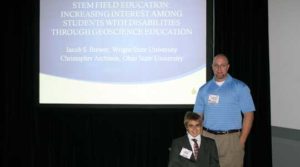The U.S. Department of Education announced yesterday the award of $1.9 million in grants to organizations in California, Missouri and Washington to help individuals with disabilities purchase the assistive technology they need.
Under the Assistive Technology Alternative Financing Program, the funds will be used to help people with disabilities get private financing to buy services and devices. Among the types of products covered would be hearing aids, computers, vehicle modifications and vision aids – but could include other devices, depending upon the person’s disability limitation, needs and goals.
“For individuals with disabilities, assistive technology can be vital to their success in obtaining employment and living independently,” said U.S. Secretary of Education Arne Duncan. “These alternative financing grants will help increase access to assistive technology for many individuals with disabilities.”
Grant recipients include:
- CA – Sacramento – California Foundation for Independent Living Centers, $648,251.
- MO – Blue Springs – Missouri Assistive Technology Council, $621,778. And,
- WA – Seattle – Washington Access Fund, $621,777.
In California, the funds will be used to establish the FreedomTech Low-Interest Loan Program, offering low-interest loans and a loan guarantee option for some applicants.
In Missouri, the grant will support Show-Me Loans, which have distributed more than $1.2 million in support to individuals with disabilities since 1998.
In Washington, the money will help the Washington Access Fund provide low-interest loans and matched savings accounts for assistive technology, as well as business equipment needed for employment or self-employment.
With a growing need for assistive technology, financial loan services such as alternative financing programs offer individuals with disabilities affordable options that can significantly enhance their access and use of this technology in ways that better ensure independence and inclusion.
The Assistive Technology Alternative Financing Program is administered by the Education Department’s Rehabilitation Services Administration, a component of the Office of Special Education and Rehabilitative Services.
Article credit: Press Office, (202) 401-1576, press@ed.gov







